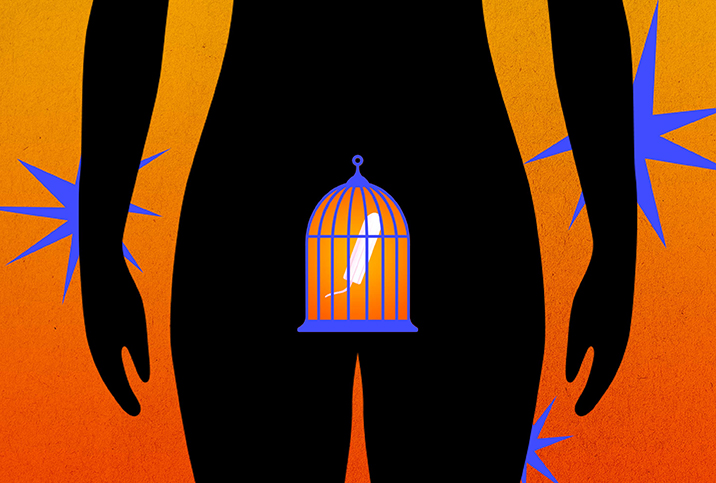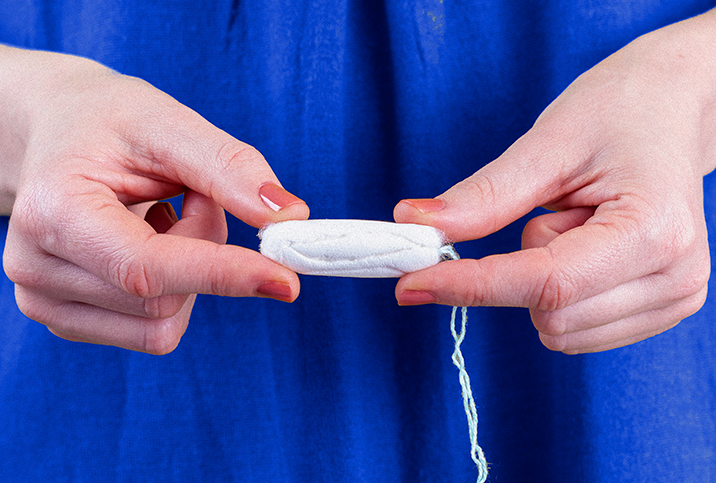Can I Sleep With a Tampon In?

Despite the surge of new period products such as period underwear and reusable pads hitting the market, many people still prefer the comfort and reliability of tampons. While tampons are considered safe for regular use, some users may switch to pads during the night due to concerns about developing toxic shock syndrome (TSS).
Is it safe to use a tampon at night?
While you may have been told that wearing pads is safer than wearing tampons at night, that's not strictly true. Barbra Hanna, D.O., an OB-GYN, menopause specialist and founder of MyMenopauseRx in Wheaton, Illinois, said it's completely safe to sleep with a tampon in as long as you are using the correct absorbency for your flow and do not leave it in place for more than eight hours.
Tampons vary in size and absorbency, from light to medium to ultra-heavy. However, they all have one thing in common: They must be changed at least every eight hours, according to major tampon brands. Even organic tampon brands made from 100 percent pure cotton need to be replaced within the correct time frame.
What if you leave it in for more than eight hours?
If you leave a tampon in place for longer than eight hours, accidents could happen. But are you at risk of infection? It's possible, according to Somi Javaid, M.D., an OB-GYN and founder and chief medical officer of HerMD, a female-founded healthcare startup in Cincinnati. When tampons are left in for longer than eight hours, the risk of TSS, along with other vaginal infections, increases because the vagina becomes a breeding ground allowing bacteria to grow, Javaid explained.
However, developing TSS is rare, and wearing a tampon for slightly longer than eight hours does not necessarily mean you will have complications.
"It is hypothesized that tampons alone do not cause TSS; tampon use and other co-environmental factors contribute to the onset of TSS," Javaid said. "While TSS is a rare complication of prolonged tampon use, it can cause fatal complications such as shock, organ failure and death."
If you experience any side effects, such as high temperature, diarrhea, nausea or vomiting, or dizziness or fainting after using tampons, you should see a doctor straight away. For severe or worsening symptoms, call an ambulance.
How to prevent an infection
Even though TSS is very rare, you can lower that risk further by using the correct absorbency for your flow. Use only high-absorbency tampons when your flow is heavy, especially if you are planning to sleep with your tampon in, Hanna said. Additionally, you should insert a new tampon just before going to bed and aim to sleep for no more than eight hours. Setting an alarm or asking someone to wake you up at the correct time can reduce the chance of oversleeping and forgetting to change your tampon.
It's usually best to go for lower absorbency when sleeping with a tampon in. If you have a heavy flow, you could pick a medium-absorbency tampon alongside a panty liner to catch any potential leaks. Some people find that panty liners are more comfortable to sleep in than sanitary pads.
If you do accidentally leave your tampon in for more than eight hours, try not to panic. Simply remove the tampon, wash your vagina and insert a fresh tampon or use a sanitary pad. Unless you develop symptoms or show signs of an infection, you should be fine.
Alternatives to use at night
There are many reasons you might want to switch to an alternative period product at night. If you enjoy morning lie-ins or struggle to wake up when your alarm goes off, you would probably prefer the peace of mind that comes with using reusable pads or period underwear. Both options can be worn throughout the night with limited risk of leakage. Many period underwear brands say their underwear can be worn for up to 12 hours, which is ideal for most nights.
There's another reason some people might wish to avoid tampons, especially the highly absorbent kind: They can extend the length of your period.
"[This] occurs as a result of a tamponade effect on the cervix," Javaid said. "Tampons can block the outflow or slow the rate of blood from the cervical opening."
Until all blood and tissue from menses have been expelled, menstruation will continue to occur.
A good alternative is a menstrual cup, which is perfectly safe to sleep in and can be worn for up to 12 hours, according to Javaid. Menstrual cups do come with a learning curve, but once you know how to use them, they are comfortable and convenient. Between uses, you need to rinse your menstrual cup with warm water and gentle soap (or a menstrual cup wash) to keep it clean. Some people find it easier to have two to three cups so they can wash them at a convenient time. At the end of your period, it's recommended to boil the cup for 10 to 20 minutes and store it away safely for its next use.


















